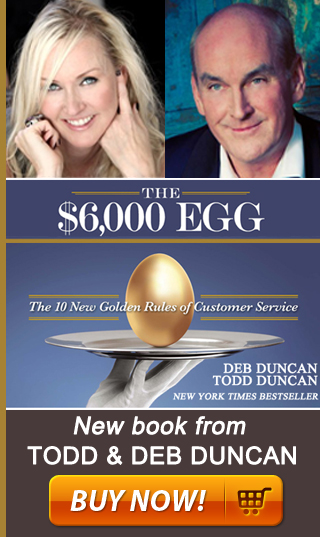Know Your Product Well; Know Your Customers Better |
Dec.3 |

By Todd Duncan
When I spoke with my friend Mike a few years ago, I was logging thousands of air miles a year. I was looking for one company to handle all of my ongoing travel needs and he knew the owner of a successful travel agency. Following our conversation, Mike arranged a meeting between the owner and me.
As a consumer, I am always open to exploring new ways to maximize the value of money that I exchange for goods and services. In this particular case, I was not only looking for new ways to stretch my traveling dollars; I was looking for innovative ways to shrink my traveling time. When the owner and I sat down, I was eager to share my most important value and needs. I wanted him to know that being home was more important than being on the road; I would spend more money on a direct flight if it got me home sooner. I was anxious to have a personalized agency that understood me.
Unfortunately, ninety seconds into our meeting, he had already lost my business.
He began with these words: “Todd, I’d like to tell you a little about our company.” And away he went. For nearly twenty minutes he told me how the agency began, how much business it was doing, and why he felt I should use the agency. He then launched in to a showering of features and benefits like the CD-ROM that I would receive every quarter with listings of hotels and restaurants. He told me about the toll-free line should any needs arise, and the emergency hotline, should I ever get stuck. He explained the quarterly reports to help me manage my travel expenses. On and on he went, pontificating about the things he thought I wanted. Finally, he said, they would make me an unlimited supply of luggage tags.
Then came the classic line: “Todd, we’d like to ask you for your business.”
Isn’t that what we have been taught to do? Ask for business?
With my arms crossed, I replied, “I’m not very motivated to give it to you.”
“I could tell,” he replied.
“For how long could you tell?”
“About five minutes into our dialogue.”
“That’s the problem,” I explained. “We haven’t had a dialogue.”
He looked at me confused.
I then asked him a series of questions to demonstrate what I meant: “What’s my favorite airline? What’s my favorite hotel? What kind of bed do I prefer? Do I like top floors or bottom floors? Near the elevator or in a corner? Smoking or non-smoking? Who pays for my travel—me or my clients? What times of day do I prefer to travel? And how many luggage tags do I already own?”
I admit, I was overdoing it but he got the point. He knew nothing about my personal values, my travel needs, or what was important to me about a relationship with a travel agency. After nearly half an hour of stating his case, he knew nothing that he needed to know in order to close the deal. I didn’t need the financial reports or the list of hotels and restaurants. I wouldn’t use the hotline. And as a frequent flyer on several airlines, I already owned plenty of luggage tags.
He started the meeting talking when he should have been ready to listen. It is often the main difference between shooting in the dark and confidently closing the deal.
Lesson Summary
In basic terms, the mistake is something I call arguing. It’s talking too much and listening too little, if at all. It’s staking your sales success on your ability to state your case in convincing fashion. It’s mastering a monologue and then expecting the jury of your prospects to take your side. But arguing only makes certain your sales get a death sentence. The reason is simple: You can’t build trust with a prospect if you’re the only one talking. Establishing an initial level of trust takes more than flowery monologue. It takes dialogue. It takes actual conversation. There is no other way for you to know that your product or service will meet a prospect’s needs.
"You can’t build trust with a prospect if you’re the only one talking."
comments powered by Disqus


 Follow me on Twitter
Follow me on Twitter Like me on Facebook
Like me on Facebook  Connect on LinkedIn
Connect on LinkedIn